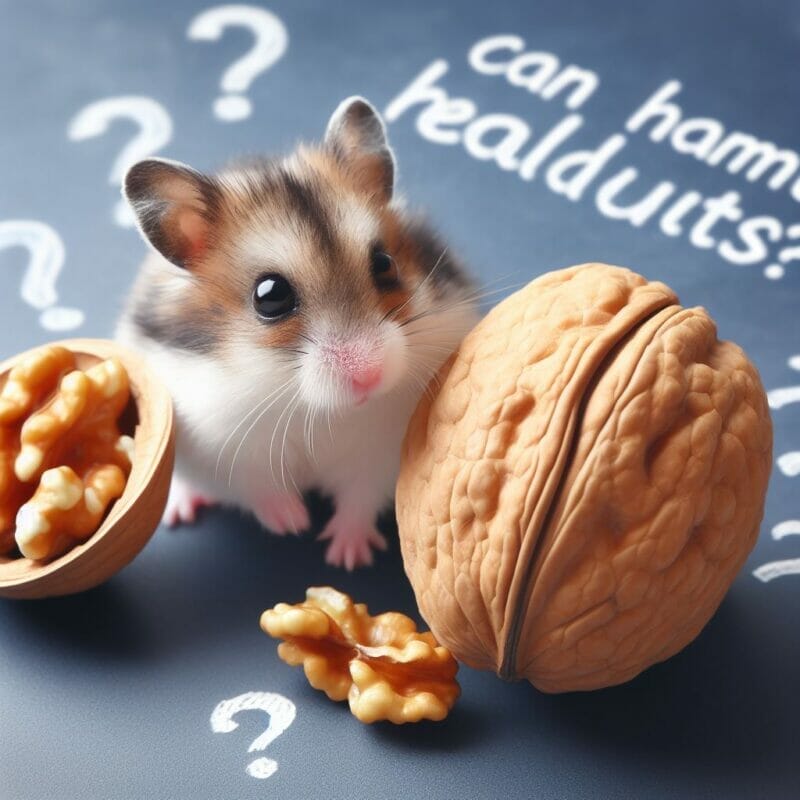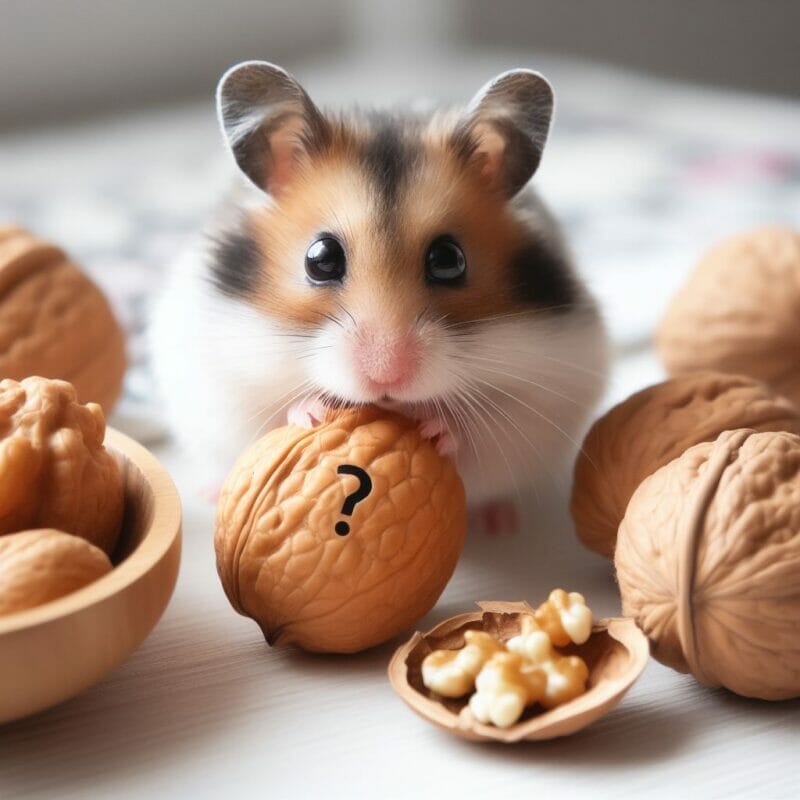Can Hamsters Eat Walnuts? Walnuts are composed of fatty acids, protein, fiber, vitamin E, copper, and manganese. This makes them a nutritious food. However, their high fat content means walnuts should only be fed to hamsters sparingly.
Can Hamsters Have Walnuts?
Yes, hamsters can eat walnuts in strict moderation. Pieces of walnut provide protein, healthy fats, and minerals that can supplement a hamster’s diet. However, walnuts are very high in fat and calories, so should only be fed occasionally and in small quantities to avoid obesity.

Can Hamsters Eat Walnuts? Walnuts make a tasty treat that hamsters will eagerly accept. But no more than 1-2 small walnut pieces 2-3 times per week is recommended. Any more frequently could lead to diet imbalance or digestive issues in small hamsters.
Benefits of Walnuts for Hamsters
Here are some of the main nutritional benefits walnuts can offer hamsters:
- Protein – Walnuts contain plant-based protein to support muscle growth and organ function.
- Healthy fats – They provide omega-3 fatty acids that contribute to a glossy coat and skin health.
- Manganese – Walnuts are high in manganese, which aids metabolism and bone development.
- Copper – Copper helps form red blood cells, blood vessels, and bone.
- Fiber – Walnuts have some fiber to support healthy digestion.
- Antioxidants – They contain antioxidant compounds that fight cell damage.
Can Hamsters Eat Walnuts? So in moderation, walnuts can provide useful nutrition to supplement a hamster’s main diet.
Risks of Walnuts for Hamsters
Can Hamsters Eat Walnuts? While walnuts offer benefits, there are also some risks to consider:
- High in fat – Too many walnuts can cause rapid weight gain and obesity.
- Digestive upset – The high fat content may cause diarrhea or tummy trouble.
- Allergies – Tree nut allergies can potentially occur. Discontinue feeding if any allergy symptoms appear.
- Choking hazard – Walnut pieces may pose a choking risk, especially for dwarf hamsters.
Can Hamsters Eat Walnuts? To avoid these risks, only feed small amounts of walnuts infrequently. Always supervise your hamster when feeding walnuts.

Symptoms of Walnut Poisoning in Hamsters
Can Hamsters Eat Walnuts? Feeding too many walnuts could potentially cause:
- Diarrhea or loose stools from the high fat content
- Weight gain or loss of appetite from excess calories
- Allergic reaction if sensitive to tree nuts – symptoms like facial swelling, hives, wheezing
- Choking if attempting to consume too large of a piece
Can Hamsters Eat Walnuts? Seek veterinary care immediately if any concerning symptoms appear after feeding walnuts. Treatment may include diet correction, medications, or allergy therapy.
How Many Walnuts Can You Give a Hamster?
Only 1-2 small walnut pieces 2-3 times per week is recommended. Remove uneaten pieces within 12 hours to prevent spoilage. A balanced hamster diet includes:
- High-quality hamster pellets available at all times
- Timothy hay and chew toys to wear down teeth
- Small daily portions of vegetables and fruits
- Other treats like plain yogurt drops, seeds, cooked egg white
- Walnuts should only occasionally supplement the staple diet foods, not become a primary food item.
Alternatives and Supplements to Walnuts
For more treat variety, also offer:
- Carrot: Provides vitamin A and beta-carotene
- Apple: Rich in vitamin C and fiber
- Blueberries: Contain antioxidants and manganese
- Cucumber: Helps hydration and offers trace minerals
- Cooked egg white: Provides lean animal protein
- Plain yogurt drops: Offer protein, calcium, and probiotics
Quality hamster food brands include:
- Oxbow Essentials Adult Hamster & Gerbil Food
- Supreme Tiny Friends Farm Reggie Rat and Mimi Mouse Food
- Brown’s Tropical Carnival Daily Diet for Hamsters
- Vitakraft VitaNature Dwarf Hamster Food
- Mazuri Rat and Mouse Diet

Can Hamsters Eat Walnuts?
Yes, hamsters can eat 1-2 small pieces of walnut 2-3 times per week in strict moderation as an occasional fatty treat.
Should I consult a vet before feeding walnuts?
Checking with an exotic vet when introducing new foods is wise, but most approve occasional walnuts for hamsters.
What are symptoms of walnut poisoning in hamsters?
Diarrhea, weight gain, loss of appetite, lethargy, choking, or allergy symptoms like hives could indicate a hamster ate too many walnuts.
How to introduce walnuts to hamsters?
Start with just a tiny bite of walnut and gradually work up to 1-2 pieces 2-3 times weekly if your hamster tolerates it well. Never exceed the recommended amount.
Can Syrian hamsters eat walnuts?
Yes, Syrians can eat 1-2 small walnut pieces 2-3 times per week as an occasional high-fat treat. Their larger size means they can handle more than dwarfs.
Can Roborovski hamsters eat walnuts?
Roborovskis should only eat a tiny pinch of walnut once a week at most due to their small digestive systems.
Can Russian dwarf hamsters eat walnuts?
Russian dwarfs can eat half a walnut at a time, 1-2 times weekly. But only in very strict moderation.
Can Teddy bear hamsters eat walnuts?
Yes, Teddy bears can have small walnut pieces sparingly, since they are dwarf sized. Stick to just 1-2 times weekly.
Can Chinese dwarf hamsters eat walnuts?
Chinese dwarfs can eat a small pinch of walnut once or twice a week safely. But be very conservative with portions.
Can dwarf hamsters eat walnuts?
Yes, but all dwarf types should only eat half a walnut at most, 1-2 times weekly. Their small size limits walnut intake.
Can Hamsters Eat Walnuts? If you take the time to educate yourself about hamster care and respect your pet’s personal space while also giving it adequate hamster breed, hamster food, exercise, and entertainment, as well as maintaining a clean environment and good health, you and your hamster should enjoy a long and happy life together. Visit our site http://hamstercare.net/
